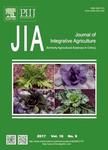Prospective use of bacteriocinogenic Pediococcus pentosaceus as direct-fed microbial having methane reducing potential
Prospective use of bacteriocinogenic Pediococcus pentosaceus as direct-fed microbial having methane reducing potential作者机构:Dairy Microbiology DivisionNational Dairy Research Institute Department of Clinical Studies School of Veterninary Medicine University of Pennsylvania Microbial Science DivisionAgharkar Research Institute Dairy Cattle NutritionNational Dairy Research Institute Dairy Cattle PhysiologyNational Dairy Research Institute
出 版 物:《Journal of Integrative Agriculture》 (农业科学学报(英文版))
年 卷 期:2015年第14卷第3期
页 面:561-566页
核心收录:
学科分类:0710[理学-生物学] 0832[工学-食品科学与工程(可授工学、农学学位)] 090502[农学-动物营养与饲料科学] 0830[工学-环境科学与工程(可授工学、理学、农学学位)] 1004[医学-公共卫生与预防医学(可授医学、理学学位)] 0905[农学-畜牧学] 0906[农学-兽医学] 09[农学] 0901[农学-作物学] 0703[理学-化学] 0902[农学-园艺学] 0713[理学-生态学]
基 金:a part of a PhD project of Sanjay Kumar that was supported by NDRI (ICAR) fellowship National Initiative on Climate Resilient Agriculture, India (NICRA) for providing partial support
主 题:Pediococcus pentosaceus bacteriocin methane direct-fed microbials rumen probiotics
摘 要:Direct-fed microbials(DFM), generally regarded as safe status, are successfully used in improving rumen ecology, gastro-intestinal health, feed efficiency, milk production and growth rate in ruminants. On the other hand, methanogenesis in rumen, which accounts for a significant loss of ruminant energy and increased greenhouse gas in environment, is of great concern, therefore, use of DFM for improving productivity without compromising the animal health and ecological sustainability is encouraged. The present study was conducted to investigate the methane reducing potential of bacteriocinogenic strain Pediococcus pentosaceus-34. Since, the culture showed no hemolysis on blood agar and DNase activity, hence, it was considered to be avirulent in nature, a prerequisite for any DFM. The culture also showed tolerance to pH 5.0 for 24 h with 0.5% organic acid mixture, whereas when given a shock for 2 h at different p H and organic acids concentrations, it showed growth at pH 3.0 and 4.0 with 0.1 and 1.0% organic acids, respectively, as having good animal probiotics attributes. The total gas production was significantly(P〈0.05) higher in live pedicoccal culture(LPC) and dead pedicoccal culture(DPC) both with wheat straw, when compared to the control. In sugarcane bagasse, gas production was significantly lower(P〈0.05) with LPC compared to the control and DPC both. Methane was reduced by the inclusion of LPC in sugarcane bagasse(0.07 mL CH4 mg–1 dry matter digestibility) with no effect on other rumen fermentation parameters. However, with wheat straw and LPC total gas, in vitro dry matter digestibility, total volatile fatty acids increased significantly but no reduction in methane production was observed in comparison to the control. Therefore, further research is warranted in this direction, if the bacteriocinogenic strains can be used as DFM for ruminants to improve the ruminant productivity.



